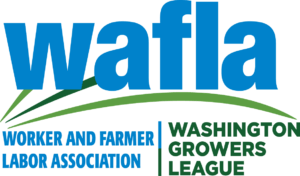Wafla opens its first farmworker housing facility in Oregon

Wafla opens its first farmworker housing facility in Oregon
Capital Press
May 5, 2022, by George Plaven
MT. ANGEL, Ore. — A former dormitory on the campus of the Benedictine Sisters monastery in Mt. Angel, Ore., will provide housing for seasonal guestworkers as Willamette Valley orchards, vineyards, hop yards and nurseries grapple with mounting labor shortages.
Wafla, formerly the Washington Farm Labor Association, began leasing the building earlier this year from the Catholic Community Services Foundation. It is the organization’s first housing project in Oregon, with three others in Washington — Yakima, Mesa and Okanogan.
Members of the community attended an open house on May 5, which also served as an introduction for new Wafla CEO Enrique “Rick” Gastelum, who was hired April 25.
Gastelum previously was chief financial officer for the Washington Farm Bureau, and before that he was a regional consultation manager for the Washington Department of Labor and Industry’s Division of Occupational Safety and Health.
Founding CEO Dan Fazio will stay with Wafla in a new role focused on strategic projects, recruiting and housing.
Born and raised in Sunnyside, Wash., Gastelum said his father was an immigrant farmworker from Mexico who picked cherries and cut asparagus in the agriculture-rich Yakima Valley. He spent spent several years working alongside his dad in the fields and orchards, and knows just how exhausting the work can be.
”I remember music playing, people working very hard, going up and down ladders,” Gastelum said. “It was difficult work, but rewarding work for them.”
Gastelum said that experience — combined with his understanding of workplace regulations and advocating on behalf of farmers — allow him to balance the symbiotic relationship between agricultural employers and their workers.
”That’s my mission at Wafla, to keep agriculture profitable and viable for everybody,” he said. “We know we have to operate a program that’s based on integrity and being good stewards of our communities.”
As domestic farm labor becomes more difficult to find, Gastelum said more producers are turning to the federal H-2A program, which provides temporary visas for agricultural workers from places like Mexico and Central America.
The number of H-2A visas issued by the U.S. Labor Department has grown every year since 2013, reaching approximately 258,000 in 2021. More than 90% of these seasonal guestworkers come from Mexico, with 3% from South Africa, 2% from Jamaica and 1% from Guatemala.
Gastelum said 30,000 H-2A workers were brought into Washington last year to help cover the industry’s labor needs. While that number was not nearly as high in Oregon, he said producers are starting to feel the pinch.
“It’s creeping up,” he said. “They’ve got crops that need to get planted, and need to be produced. ... We want to keep food production here local.”
However, to use the H-2A program farms must be able to provide housing that meets strict health and safety requirements. Wafla estimates it costs farms $12,000 to $15,000 per person, per bed to build their own housing, making it unaffordable for many small to mid-size businesses.
The dormitory in Mt. Angel was a perfect fit, Gastelum said, since it already had the space and facilities necessary to qualify for H-2A housing. There are currently 45 beds available, with two beds per room, though Gastelum said occupancy could increase as Oregon’s COVID-19 rules for workplace housing are loosened.
The building also has a communal kitchen, restrooms and enough showers to meet the minimum standard of one for every 10 workers.
Javier Garcia, a fellow H-2A worker from Mexico, will serve as the “field ambassador” for Wafla, living at the dormitory. Field ambassadors provide support to the other workers, Garcia said, explaining the rules and “what it means to live and work in the U.S.”
If there is enough interest in the facility from local farms, Gastelum said Wafla may discuss long-term lease options or possibly buying the building and making farmworker housing permanent.
“We’re always looking for these types of facilities that are turn-key,” Gastelum said. “This is a great looking place.”
